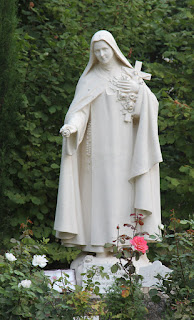Oct. 1, 2020: St. Therese of Lisieux
Oct. 1, 2020: St. Therese of Lisieux
Are you confident that you’re going to Heaven? If you said, “yes,” why are you confident?
Are you confident because you have meticulously observed all of the laws of the Church?
If you ask St. Therese of Lisieux, her confidence is entirely on the merciful love of God.
The time in which St. Therese lived, many Catholics were influenced by Jansenist heresy. Jansenism overstressed God’s transcendence (his eternal majesty and supremacy) to the degree that it misunderstood his divine justice. Christian life according to Janenism became living a very narrow moralism, stressing penance, ascetical practices, and mortification. People were terrified of God the Judge. The god that many Catholics believed at that time was not the true God of Christianity—this god was unrecognizable, impersonal, faceless, formidable, and unapproachable. This tendency still persists in the 21st century.
St. Therese had a deep conviction that “God is nothing but Mercy and Love,” and this conviction became the foundation of her “Little Way,” her definition of God. Her intuition was that the very nature of God’s Love is to be merciful. The furthest thing from Him is the desire to punish anyone and to cause suffering. St. Therese said that when we suffer, God shields His eyes so as not to look; for He is all tenderness and compassion.
Bishop Patrick Ahern commenting on St. Therese’s Little Way writes:
“She believed that God’s Mercy cannot be purchased. God must give mercy freely. All love is in fact freely given if it is truly love. God loves us for our sake, and He wants us to love Him for His sake, in a relationship that is pure and devoid of calculation. St. Therese knew that no amount of good works, no matter how heroic, could ever purchase God’s love, because He wants to and must give it freely. St. Therese even wrote that our good works are all blemished and make us displeasing to Him if we rely on them. God does not love us because we deserve to be loved but because we need to be loved. The closest comparison in human terms is the love of mother and father for their newborn child. The baby has done nothing to deserve their love. The baby’s needs are all he has to give his parents. He caused his mother pain in being born, he cries in the middle of the night and gives his parents no end of work and inconvenience, robbing them of their independence and turning them into slaves. But they are willing slaves, glad to be at his beck and call. A good father or mother will say of the child in the cradle: “He just pulls the love right out of my heart!”
St. Therese understood that this is the way God loves us. We pull the love right out of His Heart. He bends low over our weakness with a love that is full of tenderness, as parents bend over their child in the cradle. He does not hate us for our sins. It is the sins He hates for the harm they do to us and to others. They deface the beauty in us, and He longs to destroy them in the fire of mercy that burns in His Heart. St. Therese was sure of this. Her confidence was the love that casts out fear. “How can I fear God, Who is nothing but Mercy and Love?” she asked. The only “payment” God asks from us is that we seek His merciful love with confidence.
In taking the stress of good works and moving it to confidence in God’s love, St. Therese did not deny the necessity of our good works. They remain absolutely necessary, but not as bargaining chips to buy salvation. They are necessary because they are an expression of our love for God and inevitably flow from it. They make us beautiful in the eyes of God. When we fail to perform them, however—and there will often be failure, for we are weak and our nature is skewed—our reaction should not be a craven fear of God’s punishment but a confidence which leads us to depend on His mercy and starts us off again in the good life we desire.
This is St. Therese’s “theology.” The foundation on which the Little Way is built is the merciful love of God. Only when she was convinced of His limitless mercy could she walk on this joyful “Way of Confidence and Love.” This confidence in the merciful love of God takes us Home to the Father’s House.
----St. Therese's Canticle of Love----
How great and tender is our God, who has smiled on the lowly.
Eternally my heart will sing a new canticle of love.
Come, all who hunger, all who thirst, all who long for fulfillment.
The God of mercy waits for you as a mother her child.
O come to the living water, fear not your weakness.
Forever trusting in God’s merciful love.
Through the shadows of this night, love will be my guiding light.
Presence hidden from my sight, ‘til the clouds are put to flight.
Beneath your gaze I’ve blossomed forth, as a rose in the sunshine.
With joyful heart I’ve given all to the mystery of love.
In peace I will come before you with empty hands,
relying solely on your merciful love.
Through the veil your face appears, beauty shrouded, bathed in tears.
Bread of sinners I will share, rose unpetaled everywhere.
Ah! My God, I will sing of your love for this one eternal day.
For this one eternal today, eternal today.
Transformed in Love’s consuming fire, lifted up in glory.
Her fragrance filling all the earth, drawing us after her.
Until, in eternity we join in one chorus.
Forever singing of God’s merciful love.
Canticle of love, song of love.
This eternal day I will sing, sing of your love.

